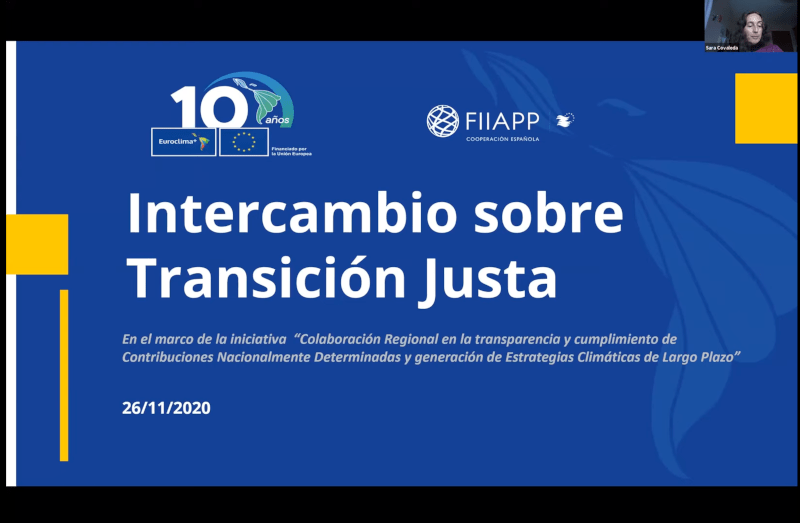The meeting served to share the status of progress in terms of policies, strategies, and action programmes on Just Transition in the Spanish and Latin American spheres, highlighting their key role in
climate action and a post-pandemic green recovery.
On Thursday, November 26, a new multi-country exchange took place to analyse the opportunities and challenges presented by the just transition concept in the transformations promoted by the Paris Agreement action framework. The event was organised by the International and Ibero-American Foundation for Administration and Public Policy, within the activities of the action “Regional Collaboration in the transparency and completion of Nationally Determined Contributions and capacity-building for Long-Term Climate Strategies”.
Just Transition is beginning to establish itself as a third pillar in climate action, along with the Mitigation of greenhouse gas (GHG) emissions and Adaptation to the impacts of global warming. Because of its emphasis on linking the environmental, economic, and social dimensions, it can help catalyse urgently needed transformations, especially in addressing the necessary economic and social reactivation due to the pandemic.
Although it is not a new approach -- it already has a certain tradition in debates about how to address Climate Change – the Just Transition has only recently been widely adopted on the international climate agenda, so there are still different interpretations about what it means in practice: "Transition", to where? and "Just", to whom?
The event highlighted the potential of the Just Transition approach to boost climate action in the current pandemic context, as the urgent need for economic revival risks overshadowing other equally urgent objectives. By linking the environmental, social, and economic agendas, this vision allows for the identification of shared goals and the enhancement of synergies. Its emphasis on equity and the employment dimension can achieve greater social acceptance and institutional support, as well as the essential financial resources needed to drive the profound structural changes required by the climate challenge.
Moreover, the participation of several countries in the region served to reveal the different approaches to the Just Transition concept, and to share the status of progress in terms of policies, strategies and action programmes in the Spanish and Latin American spheres, highlighting their key role for climate action and a green post-pandemic recovery.
The session included a presentation by Julio Rivera, who introduced the concept of just transition and shared the Spanish experience, the first country in the world to have a Just Transition Strategy, the governance around it, key actors and the instruments for its implementation. In addition, from the Chilean Ministry of Energy, Javier Obach, Head of the Environmental and Territorial Unit presented the process of decarbonisation of the energy grid that the country is proposing, and the involvement of Just Transition in addressing change in labour frameworks.
Long-term strategies can help governments manage the social impacts of decarbonisation and ensure a just and inclusive transition (IDB and DDPLAC, 2019). Well managed, the transition to a zero-emission economy is vital to avoiding climate disaster and it can also stimulate a sustainable and inclusive economic recovery. But this will not happen automatically; it is necessary to anticipate changes and adopt policy measures that are timely and effective.
The social and environmental challenges implicit in the Just Transition call for long-term action, which requires sustainable financing mechanisms and stable governance that lasts over time.
About EUROCLIMA+
EUROCLIMA+ is a programme financed by the European Union to promote environmentally sustainable and climate-resilient development in 18 Latin American countries, particularly for the benefit of the most vulnerable populations. The Programme is implemented under the synergistic work of seven agencies: the Spanish Agency for International Development Cooperation (AECID), the French Development Agency (AFD), the Economic Commission for Latin America and the Caribbean (ECLAC), the German Society for International Cooperation (GIZ) GmbH, Expertise France (EF), the International and Ibero-American Foundation for Administration and Public Policy (FIIAPP), and UN Environment.

